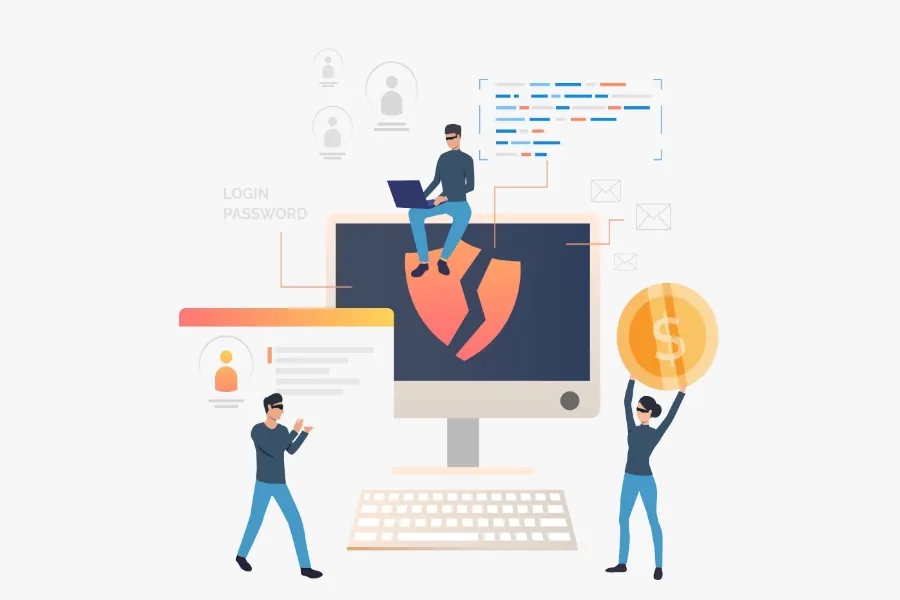Financial Identity Theft Definition & Examples
- Blog
- Financial Identity Theft Definition & Examples

Financial Identity Theft Takes a Toll on Your Finances and Your Life. Learn How to Prevent Fraud and Get Your Life Back.
Identity theft is illegal and aggravating. Identity thieves have no mercy when stealing your personal data. Fraudsters will stop at nothing to claim your identity and hard-earned credentials as their own. You can fight back! Check out our article to learn how working with Consumer Attorneys can help you before and after an identity theft attack.
Identity theft occurs when someone steals or uses sensitive and personal information like a Social Security number, birth date, name, etc., without the individual’s consent. The intent of identity theft is to commit fraud. Like identity theft, financial identity theft occurs when a thief unlawfully gains access to a victim’s personal and financial data in order to perpetuate fraud. Below are some Financial Identity theft examples of what identity thieves will steal or take when committing financial identity theft.
- Banking account numbers
- Credit card details
- Loan account numbers and details
- Tax return information
- Business financial statements and payment histories
What is Financial Identity Fraud?
The terms financial identity fraud (financial ID fraud) and financial identity theft are often used interchangeably; although there is a nuanced difference between these two. The aim of the two is the same – to benefit from another party. The main distinction between the two is the fact that financial ID theft occurs when a third party steals a person’s financial data and uses it to steal (usually money) from the victim’s account or someone else’s account. However, financial identity fraud is a bit broader and often involves the thief impersonating and misrepresenting themselves and information in order to steal and use data from someone’s personal and financial accounts.
Both financial fraud and financial info theft deal with stealing from a victim, but fraud takes criminal activity to another level when the stolen information is used to perpetrate more crimes. Below are a few instances of financial identity fraud.
- A criminal uses the victim's name and Social Security number to open bank accounts
- A thief submits an application for a loan using a victim's financial and personal details
- A perpetrator gains access to a victim’s credit card data and then uses it to purchase items either online or in person
- Hackers get access to specific financial information and use it to apply for new credit cards and accounts under the name of the victim
How to Protect Yourself
To protect yourself from financial scams and identity theft, you must be prudent and take precautions. To shield yourself from financial fraud and identity theft, it is important to remain proactive. Below are some helpful tips.
- Continue to pay attention to your credit reports
- Make sure you have strong passwords
- Use a password manager
- Enable two-factor authentication
- Install antivirus software to prevent attacks
- Keep devices updated with the latest software
Steps to Take if You are a Victim of Fraud
If you believe you are a victim of financial ID fraud, take the following steps immediately!
Step 1: Review Accounts and Contact Banking and Credit Card Institutions
Review your financial accounts in detail. If you believe your information is compromised, call your banking and credit card institutions immediately. They can take certain immediate actions to help mitigate (or lessen) any continuous fraudulent activity. Remember that it is generally not enough just to place a phone call. You likely need to also file a formal dispute. See below.
Step 2: File the Appropriate Paperwork
After reviewing your accounts, begin the paper trail process. You need to review and dispute all the charges on your accounts, no matter the type of services that have been targeted, including banks, credit accounts, or peer-to-peer platforms like Venmo and CashApp. Follow the instructions on the back of the billing statements on which the fraudulent charges are posted. Be sure to act quickly and be thorough. Certain federal and state laws offer you protection from fraudulent charges, accounts, withdrawals, etc., but your ability to dispute those activities is time-barred.
Step 3: File a Report with the Police and the FTC
The next step is to file an incident report with the police. Make sure you get a copy of the police report. You should also file a complaint with the FTC. You can do so by visiting their website and calling their identity theft hotline.
Step 4: Put Fraud Alerts and Freezes on Accounts
You should contact the consumer reporting agencies or the “credit bureaus” (Experian, Equifax, and TransUnion) to let them know about the fraudulent activity so they can update your records. They can put fraud alerts on your credit reports. Along with fraud alerts, you can freeze your accounts to avoid any continued financial identity theft. The freeze will lock your credit files which makes it difficult for thieves to open new accounts in your name.
Step 5: Continue to Monitor and Update Accounts
Consistency is important if you’re a victim of fraud because if any new suspicious transactions occur, you can contact the appropriate parties immediately to freeze accounts and put more alerts on your credit profiles. Along with consistent monitoring, you should change your passwords regularly and utilize the tips mentioned above to protect your accounts in the future. Closely monitor your credit with the credit bureaus for an extended time to be certain they are not reporting fraudulent accounts as legitimate.
Step 6: Contact Consumer Attorneys ASAP
Contacting Consumer Attorneys can help expedite your recovery process. You can also move this step up and contact us sooner rather than later. At any point in your recovery process, we can provide crucial insight, guidance, and legal advice.
How We Can Help!
If you believe you are a victim of financial identity theft you can work with law enforcement to pursue criminal charges against the thieves. Identity theft lawyer will assist you by disputing fraudulent charges, loans, mortgages, accounts, and anything else the thief fraudulently put in your name. We also help you hold financial institutions and consumer reporting agencies accountable for failing to remove fraudulent accounts from your credit reports. We file a lawsuit on your behalf and typically work with you to settle and avoid trial. Contact us to learn more!
Frequently Asked Questions

Daniel Cohen is a Founding Partner of Consumer Attorneys and a co-chair of Consumer Finance Litigation practice. Since 2017, he is a member of the National Association of Consumer Advocates and the National Consumer Law Center. Mr. Cohen is a nationally-recognized practitioner of consumer protection law. He has a wealth of proven legal experience in the US in: collective claims, representing visually impaired people who believe their rights under the Americans with Disabilities Act have been violated in both the physical and digital environments, corporate governance and dispute resolution. Read more
Related Articles









